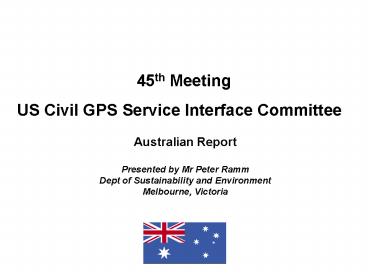Australian Report - PowerPoint PPT Presentation
1 / 18
Title:
Australian Report
Description:
Relationships between Australia and the US on civil GPS ... Airservices Australia is leading an international group to implement a Honeywell ... – PowerPoint PPT presentation
Number of Views:47
Avg rating:3.0/5.0
Title: Australian Report
1
45th Meeting US Civil GPS Service Interface
Committee
- Australian Report
- Presented by Mr Peter Ramm
- Dept of Sustainability and Environment
- Melbourne, Victoria
2
Topics
- AGCC Current activities
- National activities
- Airservices Australia
- Geosciences Australia
- GNSS in Victoria
3
Current Activities
- GNSS Vulnerability Seminar, 8 July 2005
- The seminar was held to alert the civil-GPS user
community addressing concerns of denial of
service by intentional or unintentional
interference and sought to raise awareness of the
vulnerability issues associated with
GPS-dependence. The presentations are available
at http//www.agcc.gov.au/events/agcc_seminar_0807
05.aspx. - Meeting of AGCC Chair with US GPS representatives
- In May 2005, the AGCC Chair, Prof Don Sinnott,
met with representatives of a number of Federal
Departments (Transportation, Commerce, State),
NASA and the US Coast Guard Navigation Centre for
reciprocal briefings on GPS matters. A move from
a technology focus (GNSS) to a focus on PNT
services that are delivered by technologies
including, but not limited to, GNSS would appear
to be in harmony with the US policy.
4
Current Activities - 2
- Relationships between Australia and the US on
civil GPS - A form of words describing elements of a possible
Australia/US civil agreement on GPS is being
worked through by AGCC representatives and US
Department of State officials but no formal
process has yet been initiated. - AGCC Meeting Reports
- A summary of the outcomes of the AGCC meetings
are available on its website at www.agcc.gov.au.
5
National Activities
- Airservices Australia
- The Australian air navigation service provider
signed a contract with Honeywell International 16
June 2005 to develop a ground-based regional
augmentation system (GRAS) in accordance with
ICAO Standards and Recommended Practices. An
operational GRAS is expected to be approved for
use in late 2007. - Airservices Australia is leading an international
group to implement a Honeywell beta GBAS Cat-1
system into Sydney airport by mid October 2005.
Qantas took delivery of the first four B-737NG
aircraft fitted with Ground Based Augmentation
System (GBAS) Category 1 avionics in May 2005.
An additional five aircraft will be delivered in
October 2005 and 12 A-380s will be delivered with
the GBAS Cat-1 avionics. - Airservices also intends to certify a GBAS
Category 1 satellite landing system by the end of
2007
6
GBAS Cat-1 Sydney Equipment Location
VHF Transmitter
Reference Receivers
Master Station
7
National ActivitiesGeosciences Australia
- The Australian Regional GPS Network (ARGN) now
has 21 permanent GPS tracking stations in
Australia and Antarctica (as well as Macquarie
Island in the Southern Ocean and Cocos Island and
the Christmas Islands in the Indian Ocean).
Outputs continue to improve in quality and
reliability. - Continues to run a number of GLONASS receivers
co-located with IGS base stations on mainland
Australia and contributes these data routinely to
the International GLONASS Service (IGLOS) - Continuous and episodic GPS data has been
acquired from a number of international agencies
to examine the effects of the December 2004
tsunami off Sumatra. - Manages the CGPS component of the South Pacific
Sea Level and Climate Monitoring Program.
8
National ActivitiesGeosciences Australia
- The on-line GPS processing service, AUSPos,
continues to attract users worldwide. This free
service uses a processing strategy compliant with
IGS standards, constraining the nearest three IGS
sites with the IGS products (satellite orbits,
earth orientation parameters and coordinates) to
produce results with an accuracy of a few
centimetres on a global basis. - The Real Time GPS data product (1Hz data) is now
available from 10 of the ARGN sites. This data is
being streamed to National Resources, Canada
(NRCan), (with an average delay of 0.9sec.) who
then use the information to produce global orbits
for their real time positioning service. The data
is available on the GA web site in the form of 15
minute RINEX files for use by surveyors using
kinematic positioning. It is also sent to the
International GNSS Service (IGS) and the Korean
Global Data Centre to be included in the global
analysis and production of rapid orbit products.
Real Time Meteorological data is now also
available from several ARGN.
9
ARGNGeosciences Australia
10
ARGNGeosciences Australia
11
State of Victoria ActivitiesSpatial Information
Infrastructure
- Area
- lt 3 of Australia
- Population
- 24.9 of Australia)
12
State of Victoria ActivitiesSpatial Information
Infrastructure
- GPSnet base station network covers the whole
state. - 22 base stations and growing
- Spacing between 70 to 150 km
- Broad range of services
- Post Processing
- State Wide DGPS at about 0.5 m accuracy
- RTK from most base stations
- Networked 2 cm solution being implemented in
Melbourne Region - Built on a partnership model
13
Current NetworkSpatial Information
Infrastructure
14
Dec 2005 Coverage of Real Time 2 cm
solutionSpatial Information Infrastructure
15
Target UsersSpatial Information Infrastructure
16
Users of DGPSSpatial Information Infrastructure
Moonee Valley Council Vic Police Barwon
Water Land Development consulting (private
surveyor) Equipment suppliers
17
The FutureSpatial Information Infrastructure
- State wide
- Real time
- 2-3 cm Horiz Accuracy
- 3-5 cm Vertical Accuracy
18
Future CoordinationSpatial Information
Infrastructure
- Work with other States to
- Support similar developments
- Feed their data into Victorias state solution
- Perhaps a SE Australian processing centre
- Continue to develop the positioning market































